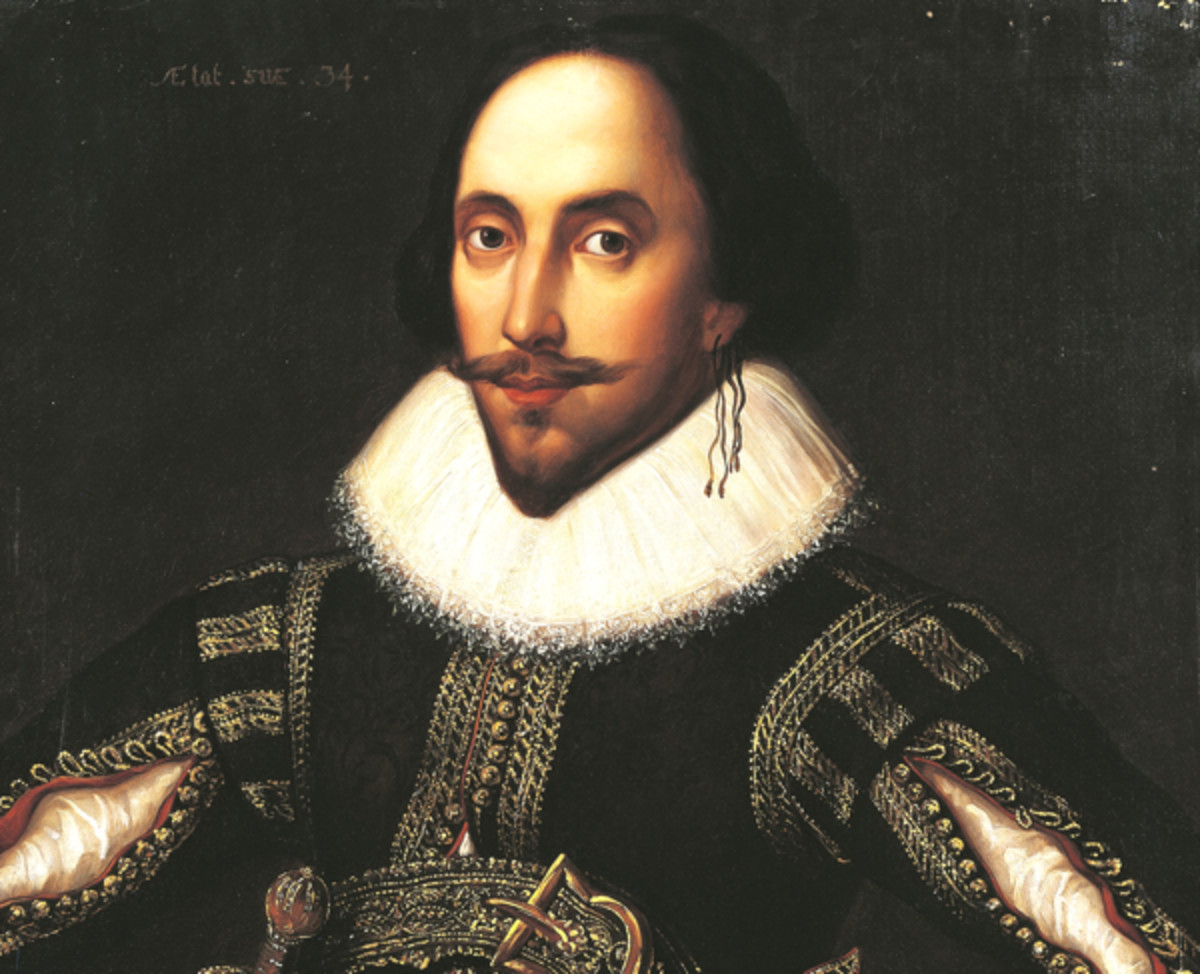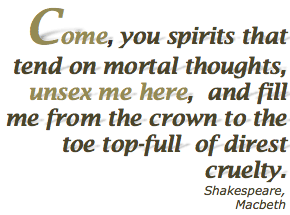Art thou afeard to be the same in thine own act and valour
As thou are in desire?
-Lady Macbeth (Macbeth)
Literature has always been the most indispensable source of both the principles and beliefs regarded by the people in the past. It gives us the consummate picture of the society and people of that period. Many authors like Shakespeare, Jane Austen, The Brontë Sisters, Sir Arthur Conan Doyle, George Orwell to name a few, have been accredited to be the most significant and celebrated authors of their respective times.

William Shakespeare(1564-1616) however, is always adjudged to be ‘ahead of his time‘ by scholars and critics. Ben Jonson even said, “He was not of an age, but for all times.” It is because umpteen Shakespeare’s novels and plays express contemporary ideas and perspectives that were not ubiquitous during the seventeenth century. His female characters often challenge patriarchal norms. He portrayed women in a peculiar and juxtaposed way; his female characters were often acknowledged as women who refused to submit to men as they were expected to, during those times and also as sensitive, responsive and delicate concomitantly. For instance, ‘Lady Macbeth‘ from ‘Macbeth‘, ‘Rosalind‘ from ‘As You Like It’, Cordelia‘ from ‘King Lear‘, ‘Tamora‘ from ‘Titus Andronicus’, ‘Viola‘ from ‘Twelfth Night‘ are all classic examples of strong female characters composed by Shakespeare. Frequently, his plays also show instances wherein female protagonists evinced cross-dressing, which was outlandish considering the time these plays were written in.

One of the most strong and unconventional characters of all time is ‘Lady Macbeth‘ from ‘Macbeth‘. Lady Macbeth is presented predominantly as a strong, powerful and valorous woman who manipulates her husband (Macbeth) to murder ‘Duncan’ to make Macbeth the King and herself the Queen. Macbeth was opposed and apprehensive about the idea; consequently, she challenges his masculinity by calling him a coward to persuade him to commit the act of killing.

She uses the societal norms of that time wherein women and men were constantly faced with expectations, to conform to gender roles as, women were expected to be fragile and men were to be strong and powerful, that confined them into prisons of propositions and conventions and even helped her to compel him to commit a horrendous crime. Macbeth was an obeying soldier who served his king but it was Lady Macbeth whose cunningness and manoeuvres led to Macbeths ultimate death towards the end. Such a female character with paramount ambitions that brooked no barriers, moral or temporal was unwonted and unconventional and till now remains so.

The dialogues of Lady Macbeth only amplify her persistence and the boundaries she could cross to achieve what she desires. She even speaks to the spirits to fill him with the attributes of a man and kill the kindness of a woman which can become an obstacle in her act of killing Duncan in case Macbeth countermands to do so. Implausibly Macbeth too admits that she was a masculine soul inhabiting a female body.
She teaches Macbeth to become a serpent and look like a flower. Her character exhibits unanticipated courage and cruelty which was in complete contrast to the image of women at that time.
So far, in this Scottish Play of Shakespeare, he creates a situational irony and allusion by showing behavioral contrasts in women and men opposed to the norms at that time but on the other hand, he shows the sensitivity and compassion of women as, when Lady Macbeth takes to killing Duncan she sees in him a reflection of her father and was thus unable to kill him. Also, when the play reaches its ending, he shows Lady Macbeth in an extremely vulnerable and fragile condition. Wherein she even dies because of her contrition and guilt. Her lust for power destroys her both in mind and body.
“Do I put up that womanly defence, To say I have done no harm?” -Lady Macbeth
The story of Macbeth is a paradigm of black and deep desires of human nature and the devastation and deploration therein. It explores a plethora of ideas at once. The aspiration to achieve ambitions, even murdering to achieve them, it is a story of desire, guilt, history and politics substantiated further by witchcraft and precognitions. A tale of extraordinary strength and power of women, be it Lady Macbeth or the three witches, it directly rebuts the ideas of fragile and weak women prevalent at that time but also displays the tenderness of women concurrently.
The strength and fearlessness of the characters of Shakespeare obliquely display the idea of feminism through such bold, brave and courageous characters. Famous English author Juliet Dusinberre even claimed Shakespeare to be ‘close to being a kind of Elizabethan Feminist’. Although feminism in its present form didn’t exist during that time, characters like these can be easily related to modern feminism. Feminism is just an idea developed in the near past, just because the word itself didn’t exist during the Shakespearean Era does not mean there weren’t strong women before. The works of Shakespeare clearly show that he thought of women as worth more than what the society allowed at that time. Perhaps he believed that women were just as strong, capable and perspicacious as men were. Gender was always a major player in almost all of Shakespeare’s works. It is widely surmised that he believed in an idea akin to modern-day feminism. Instead of commenting on women’s role in society, he used gender roles in his plays to show the audience that a woman is capable of performing a man’s role as adroitly as he does.
Shakespeare reflects and supports the Renaissance stereotypes of men and women and their roles in society. But he also questions, challenges and tries to change the representations of them, as we can see in the play, Macbeth.
The mere presentation of female protagonists in itself shows the power and pertinence of women Shakespeare acknowledged even at that time. The presence of the three witches as one of the most significant characters throughout the play from the beginning also corroborates the idea. The witches were fearless and powerful, and ultimately decided the fate of both Macbeth and Lady Macbeth through their premonitions. Hitherto, the manifestation of women in Shakespearean plays like Macbeth was completely juxtaposed and objurgating than many of his other contemporaries which often displayed them as trivial sexual objects with no power and consequence. He exhibited the women as unceremonious and zealous, directly castigating the stereotypes that circumscribed women at that time and still incarcerate them.
Similarly, Shakespeare’s other characters like Viola in Twelfth Night is portrayed as a very strong woman. She was all alone shipwrecked at the beach of Illyria. She had lost her twin brother in the wreck and was in a foreign land all by herself. But she didn’t asks for help as a helpless needy woman, rather emerged as a strong-willed independent woman, she disguised herself as a man and went on to search for a job to lead her life. She adapted the situation instead of being a damsel in distress. Later, she manipulated the circumstances to marry Duke Orsino. All this shows her strong-willed character which of course wasn’t something expected by the Elizabethan women. But as mentioned earlier, Shakespeare was someone way ahead of time. He pictured what was about to come, this is the reason that Shakespeare still appears relevant even after centuries.
Also Checkout: 7 Books That May Change Your Life















